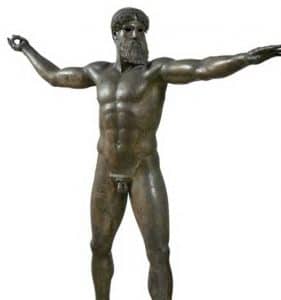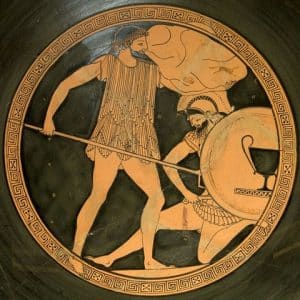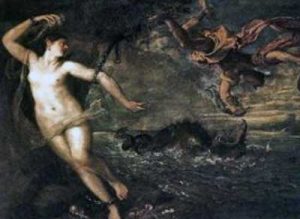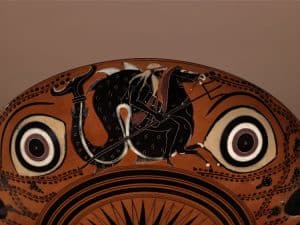The God Poseidon in Greek Mythology

According to Homer, when the three brothers grew up, they divided by lot the dominion of the world; thus, Zeus became master of the sky, of the Underworld Pluto, of the sea Poseidon. Through the epic, therefore, Poseidon was established as the god of the sea, he was therefore beloved by the Greeks of the seas, together with his wife Amphitrite.
As the patron saint of sailors and fishermen, he was depicted, always stern and bearded, with the corresponding symbols, the fish and the trident, weapon of the tuna fishermen, mounted on a chariot drawn by mixed-breed monstrous animals, half horses, half snakes.
His chariot was surrounded by fish, dolphins, other sea creatures, Nereids, other salt water deities such as Glaucus and Proteas. Due to its maritime location, it had important sanctuaries in coastal areas, such as Isthmia and Sounio (hence the epithets Pelagius and Pelagios).

The dual existence and authority of the god is interpreted by the very image of land and sea together: the land rests on the lap of the sea and is penetrated by its waters, causing springs of salt water to rise on land, like the spring at Erechtheion of the Acropolis, land and sea do not separate each other but penetrate each other creating an indissoluble unity. Therefore, as the ruler of the earth, Poseidon was also worshiped as the god of rivers and spring waters, with the epithets Krineos, Epilimnios, etc., so it is reasonable for mortals to invoke the god for fertility as well.
Characteristic, moreover, of his omnipotence is the advice of Tiresias to Odysseus, when the hero returns to his homeland, to depart with an oar towards the interior of the country, to the point where the people will take it as a shovel for plowing the of grain; there to perform sacrifices to Poseidon.
Because of his dual status, Poseidon has two places of residence: a roof on the top of Olympus, built by Hephaestus, like the rest of the Olympians, and a golden and glittering palace in the depths of the sea near the Aegis in some undisclosed Aegean location or, according to some opinions, in the north of the Peloponnese. From this palace, wherever he was, Poseidon would take his chariot drawn by two bronze legs and with golden manes and go up to the surface of the sea that was happy to open the way for him.
Because of his dual status, Poseidon has two places of residence: a roof on the top of Olympus, built by Hephaestus, like the rest of the Olympians, and a golden and glittering palace in the depths of the sea near the Aegis in some undisclosed Aegean location or, according to some opinions, in the north of the Peloponnese. From this palace, wherever he was, Poseidon would take his chariot drawn by two bronze legs and with golden manes and go up to the surface of the sea that was happy to open the way for him . The Aegean sea was named after this mythical sea seat of the god.
Poseidon in the battle of the Titans and the Giants
In the Battle of the Titans he fought on the side of Zeus wielding as a weapon the trident, which the first Cyclops had made for him, just as they had made lightning, thunder and lightning for Zeus, a leather helmet for Pluto. After the victory of the Olympians, the Ekatoghyres pushed the Titans into the bowels of the earth, into Tartarus, and Poseidon blocked the place of their prison with a copper wall
In the battle of the Giants he chased the giant Polyvotis across the Aegean sea, who moved south-east; and Poseidon cut a piece from Kos, threw it at him and crushed him. This part separated from Kos was called Nisyros.
Poseidon and Zeus
Although Poseidon has the same rights as Zeus, he nevertheless recognizes the primacy of Zeus, although sometimes he does not submit to his brother’s will. In fact, he took part in a conspiracy against him along with Hera and Athena and perhaps Apollo as well and bound Zeus by the handcuffs.
When he was freed, he punished Poseidon and Apollo by appointing them to serve Laomedon in the form of mortals; then he walled Troy either alone or together with Apollo or with Aiacus.
But Laomedon refused to give them the remuneration they had agreed upon, and Apollo sent a pestilence to the city, and Poseidon a cetus which, when the waters overflowed, came out into the plain and seized the people, until Heracles freed them from their sufferings.
Punisher and benefactor

He punished Locros, the rapist of Cassandra, by striking with his trident the rock where the hero had taken refuge after a shipwreck, because he dared to question the power of the god. He was also angry with Odysseus, because he blinded his one-eyed son Polyphemus, he threw him into the sea and in the end broke the raft that the king of Ithaca had built when leaving the island of Calypso.
For the help that the Phaeacians gave to Odysseus, he stoned the ship that carried him from Corfu to Ithaca and cut off the city from its ports by surrounding it with mountains. He flooded the Thriasian field, because Athens was awarded to Athena, while all the springs of Argolis dried up, because Phoroneas awarded Argos to Hera.
On the contrary, he saved Idomeneus from certain drowning on the return journey from Troy, because he sincerely prayed to Poseidon, recognizing the power of the god. And he promised him, if he was saved, to sacrifice to his grace the first living thing he should see on land. Except this creature was his son. Thus, Idomeneas, in order to avoid sacrificing his child but also not to appear disrespectful, left his country forever. Also, doing Athena a favor, he saved Orestes when he returned from Taurida.
He clashed with Zeus also over who would have Thetis; however, an oracle from Themis that the son born of Thetis and a god would become stronger than the father caused both gods to relent and marry her to mortal Peleus to whom Poseidon gave two wonderful horses, Valias and Xanthos.
The worship of Poseidon

When the god arrived in Attica, he struck the center of the Acropolis with his trident, from which sea water sprang up, a well of salty water, according to Pausanias, in the precinct of Erechtheion. But after a while Athena arrived, planted an olive tree on the sacred rock, in Pandrosium, and called King Cecrops to testify that she captured the Acropolis by planting for the first time on the rock. In the dispute that ensued between the two god-judges, all the gods of Olympus or Cecrops and Cranaus were appointed by Zeus. Eventually the city was awarded to Athena.
Athena named the city Athens after her, and Poseidon, blinded by his anger, flooded the Thracian field at Eleusis. Pausanias and Strabo report that the sign of the trident on the Acropolis was visible until historical times, in fact according to the traveler Pausanias the back pediment of the Parthenon depicted the quarrel of the two gods over the earth. Also for the Erechtheion it is said that the hole that exists (in the floor and in the ceiling) could be from the trident of Poseidon (or Zeus). As for the olive tree, it was shown until the second post-Christian century.
When Athena and Poseidon were competing for the protection of the kingdom of Argos, they rushed to the rivers Inachus, Asterion and Kifissus, to arbitrate the dispute; or, according to other traditions, the verdict was given by Inachus’ son, Phoroneus, who favored the goddess . Enraged, the god, in order to punish the guilty rivers and the place where they flowed, withdrew the waters from the entire region, dried up all the springs of the country and the rivers and let them fill with water only when he decided to rain.
When Danaus and his fifty daughters arrived there, chased by Egypt and his fifty sons, they found no water to drink. Then Danaus sent his fifty daughters in search of water. A Satyr tried to rape Amymone and she asked for the help of Poseidon who drove him away with a blow of the trident. A triple fountain gushed forth from the blow.
According to another variant of the myth, Poseidon revealed to the daughter the existence of the spring Lernes, the only one in which Poseidon had allowed water to gush forth, and which since then was also called the spring of Amymone. Thus, thanks to the god’s love for the daughter, the curse was lifted and Argolis regained its waters and became fertile. According to another version, Poseidon, angry with the river god Inachus and his son Phoroneus, flooded the Argolis with salt water, until Hera forced him to return the sea to its bed
He was worshiped in various parts of the Greek area, mainly in the Peloponnese through the favored Pelops (Lakonia , Messinia, Corinthia, Argolis, Ilia, Achaia, Arcadia) but also in Boeotia, Phocis, Thessaly, Evia, Tinos, Samos, Nisyros, Rhodes, Sicily, Alexandria. It was a principle of unifying power, e.g. of the Ionians, with a temple on the cape of Mykalis in Miletos, and on the island of Kalaureia, while his worship is also witnessed in Phrygia and as far as the Red Sea. Names of city-colonies, such as Potidea in Chalkidiki and Poseidonia (Paestum) in Lower Italy testify to the spread of his worship.
Poseidon in the Trojan War
In the Trojan War, Poseidon sided with the Achaeans, along with Hera and Athena, for different reasons than the goddesses wronged in the judgment of Paris. His grudge is due to the injustice that Laomedon had committed by not paying him the promised fee for building the city walls.
Sitting on the massif of Saos, in the center of the island of Samothrace, from where the high mountains of Thrace can be seen, he watches the battles in Troy.
For a while he remains uninvolved in the fight but at critical moments he intervenes, until Zeus stops him. He takes the form of Calchus, for example, to encourage the two Aedes, Telamonius and Locrus, while he motivates Teucrus and Idomeneus.
He prevents Hector from burning the ships of the Greeks, uses the time when Hera is amorously seducing Zeus and finds the opportunity to ravage her.
However, he intervenes and saves Aeneas from Achilles, covering the eyes of Achaeus with mist and drawing his son Aghisis closer to the Trojan lines. And this because it was not fated that Aeneas should die at that moment; or because he did not belong to the direct descendants of Laomedon but was descended directly from Troy.
Love afairs of Poseidon
Legitimate wife of Poseidon, queen of the sea that surrounds the world, was Nereida Amphitrite, daughter of Nereus and Dorida. As Hades saw Persephone with other Nymphs in the meadows and fell in love with her, so Poseidon saw Amphitrite leading the dance of her brothers near Naxos, fell in love with her and seized her. According to another version, the god loved the young woman but she refused to submit to his love from Aedo, so she hid in the depths of the Ocean, beyond the Heracleian Columns.
She was found by one of the seekers sent by Poseidon to the ends of the earth, the dolphin, and along with others she was led in a great procession to Poseidon for their wedding. God honored the dolphin by destroying it. It is said that with this legitimate wife they had no children, but this did not deprive Amphitrite of the title of sovereign queen of the sea. According to other versions, they had the sea gods Proteus and Triton and the daughter Cymopoleia.
From Aphrodite the god had Rhodos, who was married to Helios. (Fig. 107, 108, 109)
From the union of Poseidon with Demeter, a daughter was born, who was forbidden to be called by her name – the uninitiated called her Despoina -, and the horse Areona. This strange offspring is due to the fact that Demeter transformed herself into a mare to avoid the amorous embrace of Poseidon, but the god finally succeeded in his purpose, as he himself was transformed into a mare.
With the daughter of Aeolus Melanippi (=black mare) it is possible that he was united again having the form of a horse. Besides, from Medusa he had, in addition to the Giant Chrysaora, the winged horse Pegasus. According to one version, he is also the father of Athena from Tritonida. But father and daughter did not get along, so Athena clung to Zeus as his daughter. From Naida he had the sea demon Glaucus.
Horse and bull the animals of Poseidon
The animals most associated with Poseidon are the horse and the bull. The epithets Petraios and Hippos connect him with the demonic horse of death, with the horse as a chthonic creation. In Thelpousa, in a sanctuary near the Ladon river, on the border of Arcadia to Ilia, Erin was worshiped with a paredros, who in historical times was identified with Demeter, from whom she had a son, the horse Areion or Erion, also known in the Iliad.
In Phigalea, again in Arcadia, on the border to Messinia, the wife of Poseidon was identified with Demeter who was worshiped with the epithet melaina in a sanctuary in a cave. In the cave there was an archaic statue that represented her as a seated woman with a horse’s head.
As Hippo he was honored in the sanctuary of his daughter by Demeter in Lykosura, a strict chthonian goddess whose name was known only to the initiated, who for fear did not share it, while the uninitiated simply called her Despina. Moreover, Rhea presented a colt to Cronus instead of the newborn Poseidon, in order to save the child from the bulimic tendencies of the father, who gladly swallowed the young animal.
Poseidon has been associated with the bull since the heyday of the Minoan civilization, when he sent a bull as a sign of Minoan power and authority. Pasiphae fell in love with this bull, which Minos was bound to sacrifice to the god after his kingship was confirmed, but kept because of its beauty; from their union arose the Minotaur.
This same bull was later transported by Heracles to Attica, performing another feat in the service of Eurystheus, who freed the animal. The bull caused many disasters in the land of Attica and the deaths of many men who tried to tame it, among them the son of Minos, Androgeus. To avenge the death of his son, Minos entered Attica, defeated the Athenians and imposed a blood tax on them: their best children became prey to the Minotaur.
This bull was captured by Theseus, also son of Poseidon, and sacrificed to Athena or to Delphinus Apollo – to both gods Poseidon had yielded in the disputes between them for the sovereignty of Athens and Delphi. Theseus also killed the Minotaur in Crete.
Atlantis the island of Poseidon
When the gods divided the land, not by lot but by lot, Athens fell to Athena and Hephaestus, while the flora- and mineral-rich island of Atlantis fell to Poseidon. It was located in front of the Heraklian Columns at the exit from the Mediterranean side entering the Ocean. There lived alone Cleito, who had lost her parents, Evinor and Leukippi, on the central mountain of the island. And as the god fell in love with her, he built an enclosure of walls and ditches full of water, so that no one could have the daughter but himself.
For a long time they remained together, and Cleito bore Poseidon five times twin children. The firstborn was Atlas, who reigned on the central mountain of the island and was sovereign over the other nine brothers who each ruled one of the ten regions into which Poseidon divided the island. Accordingly, the offspring of Atlas were dominant over the offspring of the other brothers.
The construction of the island facilitated defense and trade. The majestic cities were full of tunnels, bridges, canals, intricate passages. Every year the regional kings gathered in the capital, indulged in the sacred bull hunt which they had to hunt without weapons, and communed by drinking drops of the animal’s blood. Dressed in long tunics, of a deep blue color, seated on the still warm ashes of the sacrifice and with all the lights extinguished they judged each other according to laws recorded on columns.
The island was submerged after a flood. The Athenians, according to the account of Egyptian priests to Solon, had defeated the Atlanteans when they once attempted to conquer them nine thousand years before the time of Plato. The history of the island is known from two dialogues of Plato, Timaeus and Critias
